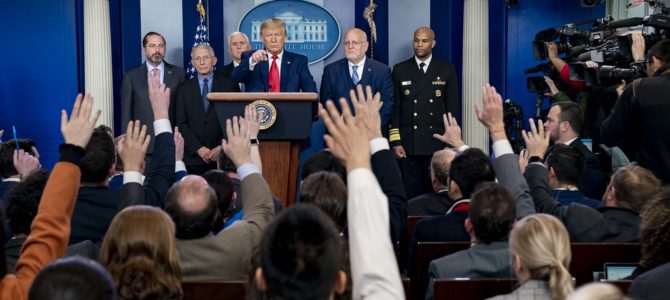
In any White House, press briefings are important for two reasons. First, they give the administration a platform to share and discuss news. Second, they give the media an opportunity to publicly challenge the administration, eliciting new information, catching the White House in lies or contradictions, and getting noteworthy non-responses, no-comments, or deflections on the record.
The media and anti-Trump left correctly made this argument when the White House halted daily briefings, although I think that decision was fair given the press’s theatrics and the president’s unusually frequent public engagement with reporters. Now that briefings are back, however, the media and anti-Trump left are complaining the very same exercise they extolled is harmful.
The claim is that Trump uses the briefings to 1) spread dangerous misinformation and 2) hold de facto rallies. First, it’s true the president has gotten information wrong at the briefings. That, of course, is why reporters are there to challenge him. As with any president, but particularly one prone to hyperbole, it’s valuable to hear his contentions and then hear how he responds to reporters’ pushback.
Second, the comparison between the sober Coronavirus Task Force briefings and Trump rallies should be so absurd to anyone who has actually seen a Trump rally and a briefing, I can only respond to the implicit suggestion that Trump is using the briefings to boost his political favor rather than inform the public. I think he’s doing both. I think that’s how all administrations approach briefings.
This president is more explicitly self-promotional, sure, and in ways that have made me cringe during our time of crisis. But, again, that’s why the press is there, to confront him about his approach, and to do it on camera for everyone to see, rather than allowing it to simply inform decisions behind closed doors without having to answer questions.
Some on the left want reporters to protest Trump by “walk[ing out]” of the room and calling him a liar. That might make for a fun soundbite, but making a scene wouldn’t leave the country better off. It would create a distracting sideshow, pulling us all into a bigger secondary battle over “fake news” when we’re already trying to sort through what’s spin and what’s fact from both sides of the podium.
Daily coronavirus briefings are not the same as daily White House press briefings under normal circumstances, during which the press secretary and other officials take questions on a wide variety of news of the day. Now, of course, the president and vice president are appearing themselves rather than letting a press secretary represent them.
The central concept still remains exactly the same: the administration gives its statement, and then engages in a rigorous public Q-and-A with reporters. It’s the concept the media defended when the White House stopped the briefings and it’s being executed exactly as it’s supposed to right now.
I have watched almost every task force briefing from start to finish. The president veers into braggadocio at times, spins on his administration’s behalf, and has gotten some facts wrong. The press, in turn, has challenged him on it. The press has also asked some stupid questions that reveal biases and bad priorities. The president has challenged them on it. That is how the routine is supposed to work.
It’s unhelpful hyperbole—and insulting to some good reporters—to compare the mostly dry briefings to a wild, one-sided Trump rally. The president gives the press a big chunk of time at the briefings every day to grill him, and they do. That in and of itself makes the rally comparison recklessly off base. Trump’s team using video clips from the briefings to promote his handling of the crisis is hardly a cost that undercuts the benefit of having him answer to the press.
These are unusual times. They demand clarity. They demand accuracy. That’s why the argument outlets should protest these briefings is backwards. The public back-and-forth is just as valuable now as it was when Trump opponents were complaining the briefings stopped.
Actually, with the president at the podium himself and a nation in crisis, they’re even more valuable. But, of course, if Trump thinks something is good, his detractors will reflexively say it’s bad.









